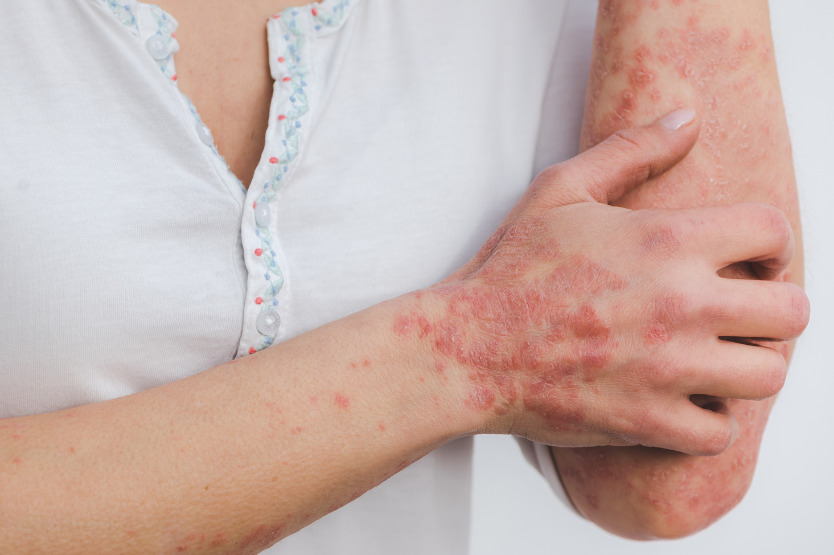If you are searching for natural solutions to psoriasis, there is hope. I’ve seen dramatic improvements with clients by incorporating dietary changes and enzyme therapy. Don’t let anyone lead you to believe that medication is the only answer.
What is Psoriasis?
Psoriasis is identified by excessive cell replication. In affected areas, cells reproduce at 1000 times
the normal rate, exceeding even the rate of skin cancer. Normal skin regenerates itself every 28 days. In
psoriasis, this process occurs every 3 to 4 days. As the skin reproduces new cells at this rate, the
the area becomes red and inflamed and can rise to three times its normal thickness.
There are different forms of psoriasis, but all involve scaly red patches in various shapes. The patches can
appear on the scalp, knees, elbows, buttocks, and sites of trauma, but there are cases in which the entire
body is involved. Typically, psoriasis begins with a small scaly spot that does not heal. Psoriasis can also
affect the nail beds.
Psoriasis is the fourth most common skin disease in the US after acne, warts, and eczema. In 50% of
people with it, there is a family history of psoriasis. People with psoriasis have a higher-than-average rate of rheumatoid arthritis. About one person in 20 with psoriasis has some form of arthritis, and about one in 20 with arthritis has psoriasis. It can manifest at any age but the peak onset occurs between 15 and 35 years. However, it can begin as early as three years of age and as late as 55.
What causes psoriasis?
The cause of psoriasis has not been determined, but the factors associated with it include food, allergies,
metabolic issues, liver, and colon problems, hyper or hypo, thyroidism, and stress.
As with most health issues diet plays a major role.
Germany had a high incidence of psoriasis prior to World War II. During the war, the disease nearly
disappeared when foods, notably Sugar, were in short supply. After the war, as the economy recovered in
food supplies, and returned to normal, psoriasis came back.
Specific metabolic factors have been linked to psoriases, such as abnormal fatty acid metabolism, elevated
levels of homocysteine in the blood, hypothyroidism, and abnormal elimination of toxins. Structural
problems and nutritional factors can also contribute to the issue.
According to John Pagano, DC, author of Healing Psoriasis, “psoriasis is the external manifestation of the
body’s attempt to eliminate internal toxins, out of accumulated in the lymphatic’s, and bloodstream by
seeping through the intestinal walls.“ The body’s elimination system, primarily the liver and the kidneys,
try to filter out these toxins. When the liver is overloaded, toxins are eliminated through the skin. as the
toxins accumulate, psoriasis begins to develop.
Undigested food can escalate skin issues, but psoriasis is aggravated by certain foods in particular. These
include undigested proteins, vegetables from the nightshade family, such as eggplant, tomatoes and
peppers, refined, sugar, pork, and alcohol. Bacteria can convert partially digested proteins into toxic
substances which contribute to excessive cell proliferation and psoriasis.
How to eliminate or reduce the symptoms
Enzyme formulas, herbal remedies, and topical creams can all support reducing or eliminating the
symptoms of psoriasis.
A diet of whole, clean, unprocessed foods and no refined or synthetic foods is key. Some even suggest a
vegetarian diet, while others believe that organic meat, with the exception of pork, is acceptable. If you have psoriasis and arthritis, it is best to avoid the nightshade family of foods. Sugar and alcohol are known to aggravate psoriasis.
Enzyme therapy
Since this is a digestion issue, enzymes are a great resource to alleviate and heal the body. However, getting the right enzyme is key. The enzyme to use for psoriasis depends on the individual, their digestive needs, and their symptoms. Some may
require more protease and others more lipase or cellulase. Some may be sugar intolerant. The best way to find out is to utilize digestive health testing. One pattern that is common for those with psoriasis is hypothyroidism.
Herbal remedies
Some herbs can support the reduced symptoms of psoriasis. These include burdock root, milk thistle, cleavers, red clover, Oregon grape root, saffron, and slippery elm. Please work with a Naturopath or herbalist before adding these.
Emotional Roots of psoriasis
Since the majority of our health issues stem from our emotions, we must consider the underlying issues. Psoriasis has a root of emotional insecurity, fear of being hurt, grief, depression, or anxiety. To learn more about the emotional and physical connections of health, I recommend Craig Miller’s work and book, Breaking Emotional Barriers to Healing.
Essential oils
Tea tree oil (melaleuca alterfolia) can be used to relieve skin and mucous membranes issues as well. It
also contains antiseptic, antibacterial, and germicidal properties. However, be sure you are using a pure source. Other essential oils that may help include lavender, bergamot, and helichrysum.
If you suffer with skin issues and found natural solutions, I’d love to hear what worked for you. However, if you still are, know there is hope and I’d love to help. You can schedule a complimentary phone chat or text us at 843-203-8003.





